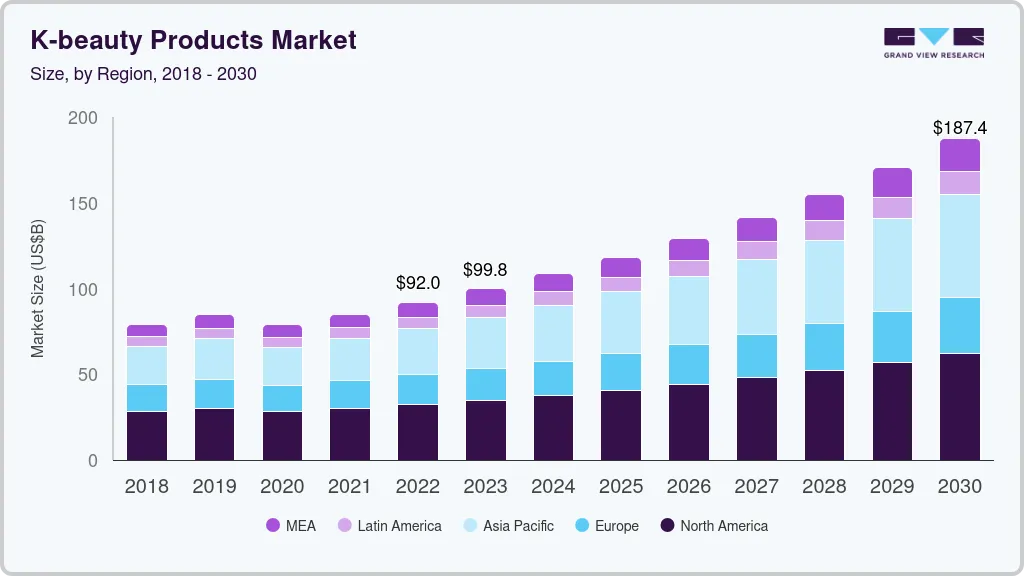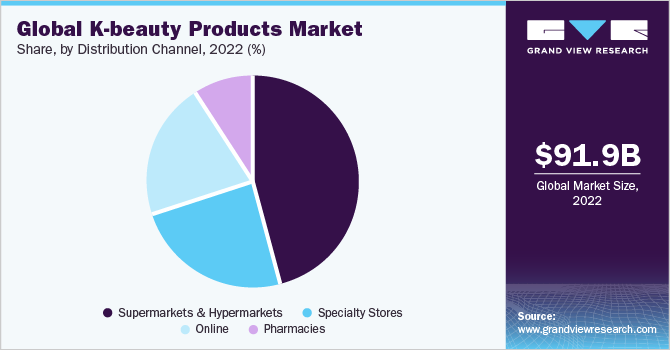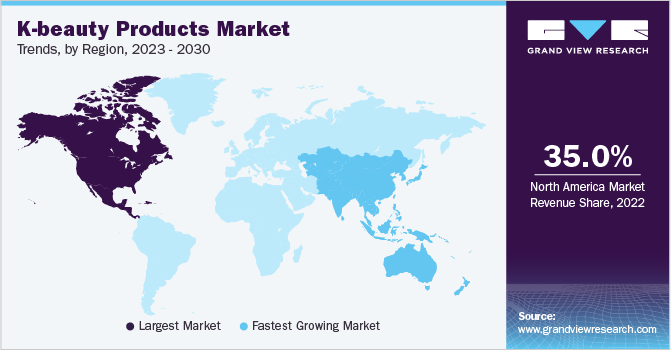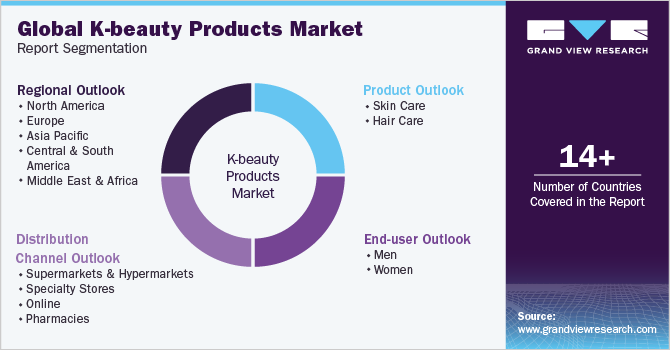- Home
- »
- Beauty & Personal Care
- »
-
K-beauty Products Market Size, Share & Growth Report 2030GVR Report cover
![K-beauty Products Market Size, Share & Trends Report]()
K-beauty Products Market (2023 - 2030) Size, Share & Trends Analysis Report By Product (Skin Care, Hair Care), By End-user, By Distribution Channel (Supermarkets & Hypermarkets, Online), By Region, And Segment Forecasts
- Report ID: GVR-4-68040-092-4
- Number of Report Pages: 80
- Format: PDF
- Historical Range: 2017 - 2021
- Forecast Period: 2023 - 2030
- Industry: Consumer Goods
- Report Summary
- Table of Contents
- Interactive Charts
- Methodology
- Download FREE Sample
-
Download Sample Report
K-beauty Products Market Summary
The global K-beauty products market size was valued at USD 91.99 billion in 2022 aand is projected to reach USD 187.4 billion by 2030, growing at a CAGR of 9.3% from 2023 to 2030. The brands producing K-beauty products prioritize using safe, effective, and often natural ingredients which is boosting the adoption rate of these products among consumers.
Key Market Trends & Insights
- North America dominated the market with a share of more than 35% in 2022.
- By product, the skin care K-beauty product segment dominated the market with a share of more than 65.8% of revenues in 2022.
- By product, the hair care segment is expected to grow at a CAGR of 10.5% over the forecast period from 2023 to 2030.
- By end-user, the women end-user segment dominated the market with a share of more than 62.7% in 2022
- By distribution channel, supermarkets and hypermarkets distribution channel dominated the market with a share of more than 45% in 2022.
Market Size & Forecast
- 2022 Market Size: USD 91.99 Billion
- 2030 Projected Market Size: USD 187.4 Billion
- CAGR (2023-2030): 9.3%
- North America: Largest market in 2023
- Asia Pacific: Fastest growing market

The Korean cosmetics industry grew steadily during the COVID-19 pandemic owing to an increase in awareness of the numerous benefits offered by the products. Moreover, due to the rise in popularity among consumers, major K-Beauty companies are taking initiatives such as R&D, product launches, mergers & acquisitions to retain shares in the market and respond to changes in the marketplace by introducing a range of items.
Celebrity influencers offer benefits to marketers due to their global reach and often transcend cultural boundaries. The top strategy applied by cosmetics brands is selling their products to Korean celebrities. Storytelling using Korean celebrities as brand ambassadors & streaming advertisements and video tutorials all over the social media platform are some of the major strategies adopted by K-beauty brands. For instance, the lip layering bar of Laniege, a South Korean brand has emerged as a highly convenient tool for individuals seeking to effortlessly achieve the trendy gradient lip look with just a single application. Notably, renowned celebrities like Song Hye Kyo and Lee Sung Kyung have embraced and utilized this product, further enhancing its appeal and desirability among consumers.
Additionally, when well-known celebrities from different parts of the world promote Korean beauty products, it fosters cross-cultural appeal and encourages individuals from diverse backgrounds to explore and adopt these products in their skincare routines. For instance, the BB Cushion Cream has garnered significant recognition, particularly from Olympic gold medalist snowboarder Chloe Kim, who highly values its impressive SPF protection and exceptional moisturizing properties, even under extreme cold weather conditions. These celebrity endorsements contribute to the commercial success and reputation of these products in the market.
K-beauty products are often packaged in visually appealing and cute designs. The attention to detail in packaging and the overall aesthetic appeal of K-beauty products add a sense of fun and playfulness to skincare routines. This aspect has resonated with consumers, making the products visually appealing and enjoyable to use. For instance, Etude House is famous for its princess-themed packaging and girly aesthetic. Their products often feature pastel colors, cute illustrations, and feminine designs.
K-beauty products are renowned for their emphasis on high-quality ingredients. Korean brands prioritize using safe, effective, and often natural ingredients. Major attention is given to ingredient sourcing, extraction methods, and manufacturing processes to ensure product quality. For instance, COSRX is a popular K-beauty brand that focuses on effective and minimalistic skincare. The brand is known for the use of unique ingredients such as snail mucin, propolis, and Centella Asiatica (also known as "cica"). These ingredients have gained recognition for their hydrating, soothing, and healing properties.
Product Insights
The skin care K-beauty product segment dominated the market with a share of more than 65.8% of revenues in 2022. The K-beauty products are applicable for all skin types without any irritation. These products can be used on sensitive skin and a variety of other skin types. Moreover, there is a growing demand for K-beauty skin care products among consumers owing to a rise in awareness and popularity. For instance, it is estimated that in 2023, 44.6% of Americans and 38.4% of Europeans have sensitive skin, according to an article on the UMMA website. The K-Beauty industry offers a wider selection of skin-friendly products for those with sensitive or mixed skin. Hence, such a scenario is expected to boost the skin care segment in the market in the long run.
The hair care segment is expected to grow at a CAGR of 10.5% over the forecast period from 2023 to 2030. Similar to skincare, K-beauty hair care products often incorporate natural and herbal ingredients. Popular ingredients include ginseng, green tea, camellia oil, and fermented botanical extracts. These ingredients are believed to provide nourishment, hydration, and improved hair and scalp health. A few of the companies offering these products are – Innisfree; Etude House; among others.
End-user Insights
The women end-user segment dominated the market with a share of more than 62.7% in 2022. There is a significant rise in the consumption of beauty products by women, who are active in social and economic routines. As income levels rise, there is a larger desire for trendy and luxury beauty products. These factors combined remain the primary drivers of demand for K-beauty products among women.
The men segment among end-users is estimated to witness the fastest CAGR of 10.2% over the forecast period. Growing skin concern among men such as aging, sensitivity, acne, dryness, and inflammatory conditions, is expected to drive the demand for K-beauty products. The K-beauty products manufacturing companies are offering innovative products specific to men like – KEOJI is offering Snail Truecica Miracle Serum an after-shave serum. The product contains mucus extract from black snail which is commonly used on therapeutic facials.
Distribution Channel Insights
The supermarkets and hypermarkets distribution channel dominated the market with a share of more than 45% in 2022. Supermarkets & hypermarkets are one-stop stores beneficial for working women with busy schedules. These retail stores have been focusing on providing in-person product demonstrations allowing customers to choose from numerous brands before making a purchase. Moreover, customers have access to a large variety of products due to their availability in supermarkets & hypermarkets.
The online distribution channel is estimated to grow with the fastest CAGR of 11.2% over the forecast period of 2023 to 2030. The expansion of the e-commerce sector in emerging markets is a key driver of market growth. Online browsing and shopping for cosmetics products is becoming more popular in China and India. Furthermore, it is anticipated that the industry will have plenty of prospects in the near future thanks to the expanding relationship between big e-commerce companies and producers of cosmetic goods in emerging economies.

In addition, it is anticipated that the industry would have plenty of opportunities in the near future due to the expanding popularity of e-commerce websites and the increased use of smartphones worldwide.
Regional Insights
North America dominated the market with a share of more than 35% in 2022. The rising skin care, creative product branding, routine awareness, and advertising methods are the main drivers of the North American cosmetics market. Popular K-beauty brands like AmorePacific are expanding their offerings in the U.S. and Japan. Additionally, the availability of a large number of offline retail chains offering cosmetics products is another factor driving the market across the region.

Asia Pacific is expected to witness the fastest growth in the CAGR of 10.6% from 2023 to 2030. Additionally, the expanding industrial growth is further bolstered by the sales increase in per capita income in emerging countries such as India, China, and others. Also, the personal care market is projected to grow over the foreseeable future in developing nations creating the considerable potential for the market to thrive. According to Korean National Statistical Office, online sales of cosmetics totaled $9.6 billion in 2021, a 1.6 percent decrease from the year previously.
Key Companies & Market Share Insights
The market for K-beauty products is extremely competitive, with many businesses providing various tour types. To effectively compete, many major players are focusing the majority of their attention on new product types, product launches, collaborations, and branching into new markets.
-
In July 2022, products brand Saturday Skin partnered with Nykaa to expand its presence in the Indian market. Through this partnership, Saturday Skin will be offering a variety of skincare products via the Nykaa website and mobile app.
-
In November 2022, L’Oréal announced the launch of C-Beauty, K-Beauty, and J-Beauty consumers in collaboration with Shihyo, a Korean brand. The brand's range includes 24 herbal ingredients steeped in fermented rice and other innovative Asian techniques.
Some prominent players in the global K-beauty products market include:
-
BANILLA CO
-
AMOREPACIFIC
-
The Crème Shop
-
Clio
-
CARVER KOREA CO. (Unilever)
-
Able C&C
-
The Face Shop, Inc.
-
Nature Republic
-
TolyMoly
-
LG HOUSEHOLD & HEALTH CARE LTD.
K-beauty Products Market Report Scope
Report Attribute
Details
Market size value in 2023
USD 99.83 billion
Revenue forecast in 2030
USD 187.4 billion
Growth rate
CAGR of 9.3% from 2023 to 2030
Base year for estimation
2022
Historical data
2017 - 2021
Forecast period
2023 - 2030
Quantitative units
Revenue in USD million, CAGR from 2023 to 2030
Report coverage
Revenue forecast, company ranking, competitive landscape, growth factors, trends
Segments covered
Product, end-user, distribution channel, region
Regional scope
North America, Europe, Asia Pacific, South America, Middle East & Africa
Country scope
U.S.; Canada; U.K.; Germany; France; China; Japan; Singapore; Australia; Brazil; South Africa; UAE
Key companies profiled
BANILLA CO; AMOREPACIFIC; The Crème Shop; Clio; CARVER KOREA CO. (Unilever); Able C&C; The Face Shop, Inc.; Nature Republic; TolyMoly; LG HOUSEHOLD & HEALTH CARE LTD.
Customization scope
Free report customization (equivalent up to 8 analysts’ working days) with purchase. Addition or alteration to country, regional & segment scope.
Pricing and purchase options
Avail customized purchase options to meet your exact research needs. Explore purchase options
Global K-beauty Products Market Report Segmentation
This report forecasts revenue growth at global, regional & country levels and provides an analysis of the latest industry trends and opportunities in each of the sub-segments from 2017 to 2030. For the purpose of this study, Grand View Research has segmented the global K-beauty products market report based on product, end-user, distribution channel, and region.

-
Product Outlook (Revenue, USD Million, 2017 - 2030)
-
Skin Care
-
Cleanser
-
Moisturizer
-
Serum
-
Sunscreen
-
Others
-
-
Hair Care
-
Shampoo
-
Conditioner
-
Serums
-
Others
-
-
-
End-user Outlook (Revenue, USD Million, 2017 - 2030)
-
Men
-
Women
-
-
Distribution Channel Outlook (Revenue, USD Million, 2017 - 2030)
-
Supermarkets and Hypermarkets
-
Specialty stores
-
Online
-
Pharmacies
-
-
Regional Outlook (Revenue, USD Million, 2017 - 2030)
-
North America
-
U.S.
-
Canada
-
-
Europe
-
U.K.
-
Germany
-
France
-
-
Asia Pacific
-
China
-
Japan
-
Singapore
-
Australia
-
-
Central & South America
-
Brazil
-
-
Middle East & Africa (MEA)
-
South Africa
-
UAE
-
-
Frequently Asked Questions About This Report
b. The K-beauty products market was estimated at USD 91.99 billion in 2022 and is expected to reach USD 99.83 billion in 2023.
b. The K-beauty products market is expected to grow at a compound annual growth rate of 9.3% from 2023 to 2030 to reach USD 187.4 billion by 2030.
b. Asia Pacific dominated the K-beauty products market with a share of around 29.1% in 2022. This is owing to the people are moving toward a healthy lifestyle and are thinking of a sustainable environment, thus preferring beauty products made from organic and plant-based ingredients
b. Some of the key players operating in the K-beauty products market include BANILLA CO, AMOREPACIFIC, The Crème Shop, Clio, CARVER KOREA CO. (Unilever), Able C&C, The Face Shop, Inc., Nature Republic, TolyMoly, and LG HOUSEHOLD & HEALTH CARE LTD.Coty Inc.
b. Key factors that are driving the K-beauty products market growth include the rising awareness of chemical-free beauty products and the rising popularity of personalized skincare products.
Share this report with your colleague or friend.
Need a Tailored Report?
Customize this report to your needs — add regions, segments, or data points, with 20% free customization.

ISO 9001:2015 & 27001:2022 Certified
We are GDPR and CCPA compliant! Your transaction & personal information is safe and secure. For more details, please read our privacy policy.
Trusted market insights - try a free sample
See how our reports are structured and why industry leaders rely on Grand View Research. Get a free sample or ask us to tailor this report to your needs.










